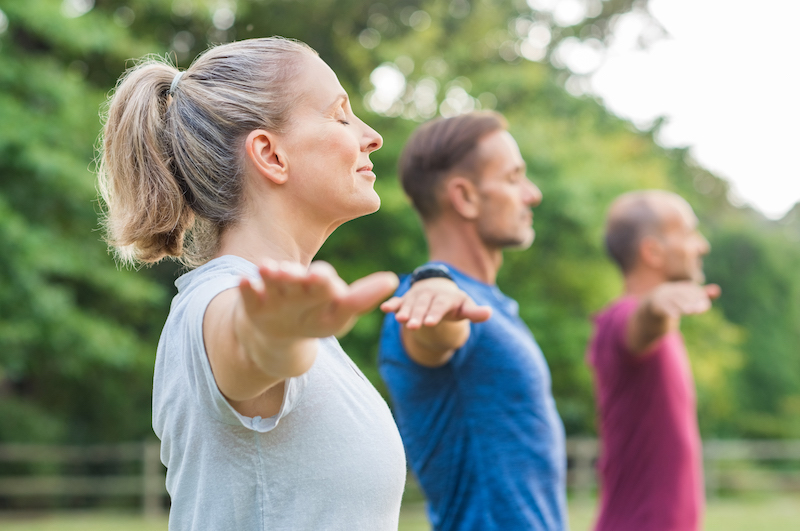[et_pb_section bb_built=”1″][et_pb_row][et_pb_column type=”4_4″][et_pb_text]

You workout regularly and watch your diet just to stay healthy but shouldn’t that apply to your hearing too? Many people see a loss of hearing as a something that happens naturally due to aging but fail to take it into account how bad habits affect it. The hearing sense is one the most important you have and what you do now does matter if you want to keep it. Everything from eating fast food to refusing to give up the cigarettes to hitting the couch for hours at a time contributes to changes in the hearing related to aging. It’s time to make some positive choices by considering preventative measures that benefit your heart and hearing at the same time.
Regular Workouts
Exercise is the single best thing you can do for your entire body including your ears. A 2009 study conducted by the American Speech-Language-Hearing Association (ASHA) determined there is a connection between heart health and the gradual hearing loss associated with aging. They found that heart disease was a factor in hearing loss very late in life and failure to exercise leads to cardiovascular disease.
A 2013 study published in The American Journal of Medicine looked at how body mass index (BMI), waist circumference and physical activity factored into the hearing equation. They were able to conclude that the better fit you are, the better your chance of keeping your hearing. Even the American Journal of Audiology identified a direct link between cardiovascular health and hearing function. With that much proof on hand, it’s clear that sitting on the couch day after day will cost you in many ways, so start a regular workout schedule or, at least, find time to take a walk most days of the week.
Balanced Diet
There is a reason mom said you are what you eat. There is a certain nutritional aspect to maintaining ear health. Omega 3 fatty acids, for instance, are deemed healthy foods good for the heart but studies show they also help protect you against age-related hearing loss. Look to get some omega-3 fatty acids in oily fish like salmon.
While you are out shopping for fish, make sure to get pick up some greens, too. Spinach, kale and asparagus are all rich in folic acid, an antioxidant that helps to reduce nerve damage including the type that keeps the ears from talking to the brain. Add some magnesium found in bananas and artichokes to your plate and you are eating your way to better ear health.
Start Eating to Prevent Chronic Disease
When it comes to what you eat, the rest of the body matters just as much as your ears. Preventing chronic illnesses like hypertension, cardiovascular disease and type 2 diabetes also protects your hearing. It might surprise you to know the kinds of foods can help fight disease like:
- Wine – Red wine is good for the body, especially the heart, in moderation. Just be sure to keep it to one glass a day and check with your doctor before you start.
- Cocoa – You know that good stuff chocolate is made from, a little each day will improve your brain health without blowing your diet. When you shop, look for dark chocolate with a high percentage of cacao.
- Almonds – They make an effective and efficient high-protein snack with lots of crunch to help lower cholesterol levels for better heart and brain health. Stick to just a few each day, though. They add a lot of calories to your diet.
While meal planning, find ways to cut the salt. Excess salt leads to water retention and higher blood pressure.
Sound Hygiene
Of course, there are things you need to do just for your ears when focusing on your health. Sound hygiene refers to protecting your ears from sounds that can cause damage. Avoid wearing headphones or earbuds to listen to music or talk on the phone. They introduce sound directly into the ear canal. By the time it reaches the delicate mechanisms of the inner ear, it is amplified enough to wreak havoc. If you are going out for the night to hear a band or dance, wear ear protection to prevent the loud noise from causing ear trauma.
Get Quality Sleep
If you need eight hours a night, then make you get them. See a doctor if you think you might sleep apnea, as well. Sleep apnea is often a sign of an underlying problem like will affect the ears like poor circulation or inflammation. Research suggests that those with untreated sleep apnea most likely have hearing problems, especially with low and high-frequency sounds.
Learn to live right and your ears will thank you. If you already think you have hearing problems, now is the time to see your doctor for a professional hearing exam and test.
[/et_pb_text][/et_pb_column][/et_pb_row][/et_pb_section]
